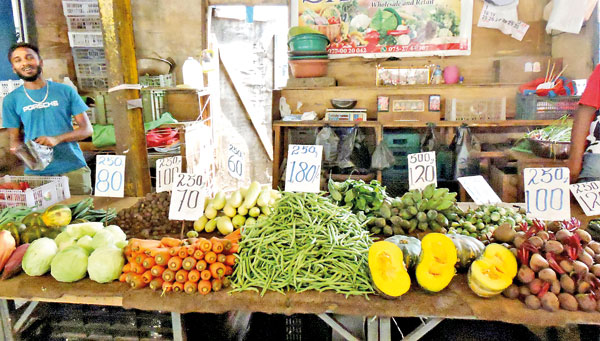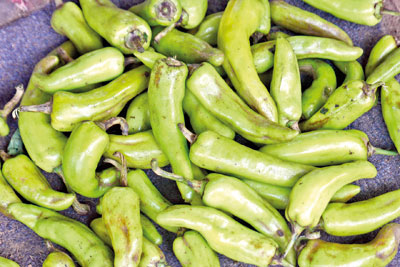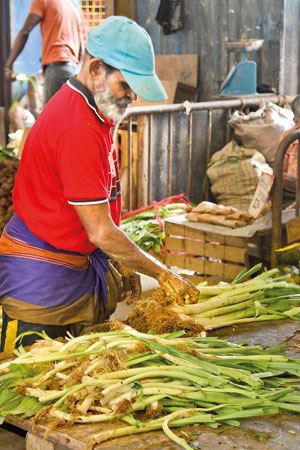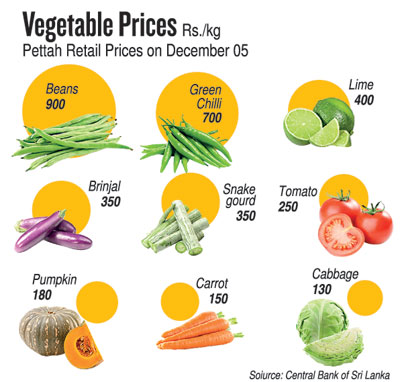News
Flood devastation of farmland drives up prices of veggies
View(s):
Vendors at Pettah market expressed frustration, attributing the price increase to flooded farmlands

Leslie Liyanage
By Nathara Abeywickrema and Dilushi Wijesinghe
The recent persistent heavy rains have led to a noticeable increase in prices of vegetables at wet markets.
Vendors at Pettah market expressed frustration, attributing the price increase to flooded farmlands. “Many fields are waterlogged, and crops are either damaged or completely destroyed. This limits our supply and forces us to raise prices,” said Sunil Perera, a long-time vendor.
Haven Pieris, a vegetable vendor at the Narahenpita Economic Centre, explained that vegetables are damaged during transport and become unsuitable for consumption. To compensate for the losses, the prices of other vegetables are often increased.
At the Narahenpita Economic Centre, the priciest veggies were beans and capsicum which were selling at Rs. 1,000 a kilo.
Some vendors in the market do not display prices of certain vegetables. When questioned, they say the the recent price increases have been caused by the adverse weather.

Among the priciest veggies: Capsicum. Pix by Eshan Fernando
Adding to the woes of buyers is the low quality of vegetables.
Leslie Liyanage, criticised the produce. “Retailers are bringing rotten and low-quality vegetables straight to Pettah. On top of that, the prices are outrageous. It is becoming impossible to budget for groceries because the price is not the same every day.”
In Welimada, prices of vegetables have fallen due to a decline in demand from vendors who come from other provinces to purchase produce. There is an excess supply of vegetables and it has driven down prices. Farmers and vendors are compelled to sell their stock locally at reduced prices to avoid wastage. This dynamic highlights how market demand, influenced by factors such as transport challenges and regional purchasing patterns, directly impact the pricing of agricultural goods.
These complaints underscore the cascading effects of erratic weather patterns, which have not only impacted crop yields, but also disrupted the entire supply chain.

Complaints of rotten veggies being brought to Pettah
In addition to vegetables, the country is grappling with a severe coconut shortage.
Professor L.K. Weerasinghe, of the Department of Crop Science, Faculty of Agriculture, University of Peradeniya commented on the underlying reasons. “For over seven years, coconut plantations have suffered from a lack of proper fertilisers, weakening the trees and reducing yields,” he said.
Compounding the issue are macro pests, monkeys, and the lack of investments in proper plantation management, which together have led to significantly smaller harvests.
Farmers are now reporting that the yield has dropped to one or two nuts, in stark contrast to the usual 10 to 15 nuts per bunch. Prices have risen as a result.
The low yield is a challenge for coconut-based industries, ranging from oil production to desiccated coconut exports. Boosting productivity is essential, particularly by ensuring access to critical inputs like fertilisers.
Professor Weerasinghe emphasised that without immediate intervention, such as subsidies for fertilisers and pest control, the coconut industry may face long-term setbacks.
W. Indrani, a coconut vendor at the Narahenpita Economic Centre, said she had closed her shop for five days due to a severe shortage of coconuts sourced from Kuliyapitiya. She said the scarcity was due to two main factors: pests, including the grizzled giant squirrel and monkeys, and the prolonged lack of fertiliser over the years.
The current situation paints a grim picture of how unprepared systems can buckle under the pressure of extreme weather. While short-term solutions like price controls and government intervention can ease consumer burdens, Prof. Weerasinghe stressed the need for sustainable agricultural practices and investments in infrastructure.
He also said that coconut shortages typically become apparent every December, as the yield is lower compared with other harvest seasons.
He said that in Chillaw and Kurunegala, major coconut growing regions, vendors have observed inflating prices, effectively creating a monopolistic “mafia” in the market.
Additional reporting by K. R. Rajamanthri in Welimada

The best way to say that you found the home of your dreams is by finding it on Hitad.lk. We have listings for apartments for sale or rent in Sri Lanka, no matter what locale you're looking for! Whether you live in Colombo, Galle, Kandy, Matara, Jaffna and more - we've got them all!

